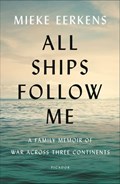An epic memoir of one family's experiences on both sides of WWII that questions what we know about the conflict while tracing the effects of war.
In March 1942, Mieke Eerkens' father was a ten-year-old boy living in the Dutch East Indies. When the Japanese invaded the island, he, his family, and one hundred thousand other Dutch civilians were interned in a concentration camp and forced into hard labor for three years. After the Japanese surrendered, Mieke's father and his family were set free in a country that plunged immediately into civil war.
Across the globe in the Netherlands, police carried a crying five-year-old girl out of her home at war's end, abandoned and ostracized as a daughter of Nazi sympathizers. This was Mieke's mother. She would be left on the street in front of her sealed home as her parents were taken away and imprisoned in the same camps where the country's Jews had recently been held. Many years later, Mieke's parents met, got married, and moved to California, where she and her siblings were born. While her parents lived far from the events of their past, the effects of the war would continue to be felt in their daily lives and in the lives of their children.
All Ships Follow Me moves from Indonesia to the Netherlands to the United States, and spans generations, as Mieke recounts her parents' lives during and just after the war, and travels with them in the present day to the sites of their childhood in an attempt to understand their experiences and how it formed them. All Ships Follow Me is a deeply personal, sweeping saga of the wounds of war, and the way trauma can be passed down through generations.
Praise for All Ships Follow Me
"Honest, unflinching, reflective, and carefully researched. . . . Eerkens's self-awareness and desire to honestly grapple with the history in front of her is worth every sentence. Reality is never an absolute, and truth is always messy." — Book Riot
"A generational memoir of war and its long-lasting effects on descendants. . . . The author examines the psychology of loss on the part of children caught helplessly in tumultuous events. . . . The sins of the fathers are visited on their children, indeed. Eerkens' poignant book sheds new light on the history of World War II." — Kirkus Reviews

